Darkness
 Buchcover
Buchcover
"Bei Lord Byron in dem berühmten Gedicht 'Darkness' von 1816 verlischt die Sonne und die Menschen sind zum ersten Mal ganz allein mit ihrer Katastrophe. Das ist ein früher Text und einer der allerersten, die Gott eben nicht mehr mit in Betracht ziehen und sagen: Das ist kein Strafgericht, sondern das ist eine rein säkulare Katastrophe. Was sich hier nun zeigt, ist ein Wesenskern des Menschen, der sehr pessimistisch gefasst wird. Bei Byron fallen die Menschen übereinander her, fressen einander auf, und das vielleicht Unheimliche daran ist, dass dieses Szenario einer verdunkelten Welt 2006 noch einmal von Cormac McCarthy aufgegriffen wurde. Und auch hier noch mal ein Mensch vorgeführt wird, der restlos nur noch seinen egoistischen Überlebenstrieben folgt." Eva Horn
„Mit Lord Byrons "Darkness" und Cormac McCarthys "The Road" sind Anfangs- und Endpunkt der Analyse von Eva Horn markiert. 1816 bis 2006. Knapp zweihundert Jahre dauert das moderne Verständnis einer selbst gemachten - und nicht durch höhere Mächte verursachten - Katastrophe demnach bereits an. Die Germanistik-Professorin von der Universität Wien seziert mit beeindruckendem Hintergrundwissen und furioser Sprachhandhabung Schicht um Schicht der Zukunftsvisionen. Dabei sticht ins Auge, dass bei aller Unterschiedlichkeit in inhaltlichen Komponenten, sich immer wieder ein Topos durch die Moderne zieht: Das unausgesprochene Begehren nach der Katastrophe.“
Matthias Eckoldt bespricht heute im Deutschlandfunk:
Eva Horn: "Zukunft als Katastrophe". S. Fischer Verlag.
Leseprobe
George Gordon Lord Byron:
Darkness
I had a dream, which was not all a dream.
The bright sun was extinguish'd, and the stars
Did wander darkling in the eternal space,
Rayless, and pathless, and the icy earth
Swung blind and blackening in the moonless air;
Morn came and went--and came, and brought no day,
And men forgot their passions in the dread
Of this their desolation; and all hearts
Were chill'd into a selfish prayer for light:
And they did live by watchfires--and the thrones,
The palaces of crowned kings--the huts,
The habitations of all things which dwell,
Were burnt for beacons; cities were consum'd,
And men were gather'd round their blazing homes
To look once more into each other's face;
Happy were those who dwelt within the eye
Of the volcanos, and their mountain-torch:
A fearful hope was all the world contain'd;
Forests were set on fire--but hour by hour
They fell and faded--and the crackling trunks
Extinguish'd with a crash--and all was black.
The brows of men by the despairing light
Wore an unearthly aspect, as by fits
The flashes fell upon them; some lay down
And hid their eyes and wept; and some did rest
Their chins upon their clenched hands, and smil'd;
And others hurried to and fro, and fed
Their funeral piles with fuel, and look'd up
With mad disquietude on the dull sky,
The pall of a past world; and then again
With curses cast them down upon the dust,
And gnash'd their teeth and howl'd: the wild birds shriek'd
And, terrified, did flutter on the ground,
And flap their useless wings; the wildest brutes
Came tame and tremulous; and vipers crawl'd
And twin'd themselves among the multitude,
Hissing, but stingless--they were slain for food.
And War, which for a moment was no more,
Did glut himself again: a meal was bought
With blood, and each sate sullenly apart
Gorging himself in gloom: no love was left;
All earth was but one thought--and that was death
Immediate and inglorious; and the pang
Of famine fed upon all entrails--men
Died, and their bones were tombless as their flesh;
The meagre by the meagre were devour'd,
Even dogs assail'd their masters, all save one,
And he was faithful to a cor[p]se, and kept
The birds and beasts and famish'd men at bay,
Till hunger clung them, or the dropping dead
Lur'd their lank jaws; himself sought out no food,
But with a piteous and perpetual moan,
And a quick desolate cry, licking the hand
Which answer'd not with a caress--he died.
The crowd was famish'd by degrees; but two
Of an enormous city did survive,
And they were enemies: they met beside
The dying embers of an altar-place
Where had been heap'd a mass of holy things
For an unholy usage; they rak'd up,
And shivering scrap'd with their cold skeleton hands
The feeble ashes, and their feeble breath
Blew for a little life, and made a flame
Which was a mockery; then they lifted up
Their eyes as it grew lighter, and beheld
Each other's aspects--saw, and shriek'd, and died--
Even of their mutual hideousness they died,
Unknowing who he was upon whose brow
Famine had written Fiend. The world was void,
The populous and the powerful was a lump,
Seasonless, herbless, treeless, manless, lifeless--
A lump of death--a chaos of hard clay.
The rivers, lakes and ocean all stood still,
And nothing stirr'd within their silent depths;
Ships sailorless lay rotting on the sea,
And their masts fell down piecemeal: as they dropp'd
They slept on the abyss without a surge--
The waves were dead; the tides were in their grave,
The moon, their mistress, had expir'd before;
The winds were wither'd in the stagnant air,
And the clouds perish'd; Darkness had no need
Of aid from them--She was the Universe.(1816)
Finsternis
Ich hatte einen Traum, der keiner war.
Die Sonne war erloschen, und die Sterne,
verdunkelt, schweiften weglos durch den Raum,
kein Mond, die Erde schwang im Äther, blind
und eisig sich verfinsternd; kam der Morgen
und ging und kam––er brachte keinen Tag,
die Menschen fühlten sich im Stich gelassen,
vergaßen ihre Leidenschaften; Herzen
gefroren, frönten dem Gebet um Licht:
am Feuer lebten sie, und alles brannte––
die Throne, die Paläste wie die Hütten
und die Behausungen der kleinen Leute
waren Scheiterhaufen, Städte warn zerstört,
ihr Heim in Flammen, sahn die Menschen zu
und schauten sich noch einmal ins Gesicht;
wie glücklich, wer im Auge der Vulkane
zuhause war, im Fackellicht der Berge:
angstvolle Hoffnung nur enthielt die Welt;
die Wälder brannten, schwanden Stund um Stund,
zerfielen, Stümpfe knisterten, erloschen,
ein letztes Knirschen, und––alles war schwarz.
.................
Die vollständige Übertragung von Günter Plessow
ist nachzulesen auf Signaturen.

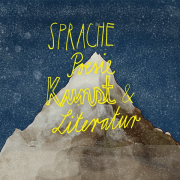
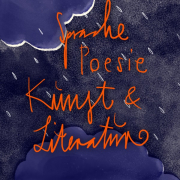

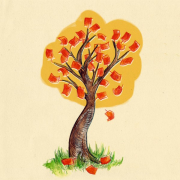
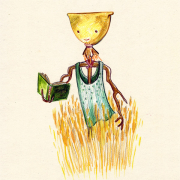


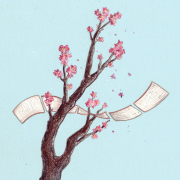
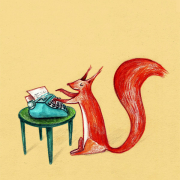
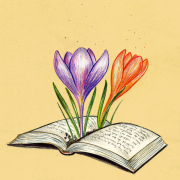
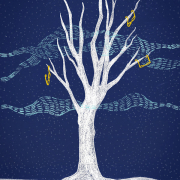
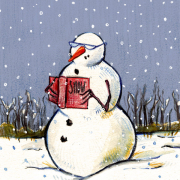
Neuen Kommentar schreiben